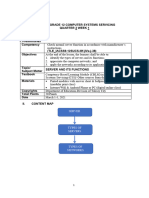Server
A server is a computer designed to process requests and deliver data to other (client)
computers over a local network or the internet. Although any computer running special
software can function as a server, the most typical use of the word references the very large,
high-powered machines that function as the pumps pushing and pulling data across the
internet.
Most computer networks support one or more servers that handle specialized tasks.
As a rule, the larger the network—in terms of clients that connect to it or the amount of data
that it moves—the more likely it is that several servers play a role, each dedicated to a
specific purpose.
Strictly speaking, the server is the software that handles a task. However, the powerful
hardware that supports this software is also usually called a server because server software
coordinating a network of hundreds or thousands of clients requires hardware much more
robust than what you'd buy for ordinary consumer use.
Common Types of Servers
A large, general-purpose network supporting a medium-sized company will likely deploy
several different types of servers:
Web servers, to show pages and run apps in connecting Web browsers
Email servers, to facilitate the sending and receiving of messages
FTP servers, to support the moving of files through File Transfer Protocol tools
Identity servers, to support logins and security roles for authorized users
Hundreds of different types of specialized server types support computer networks. Apart
from the common corporate types, home users often interface with online game servers, chat
servers and even streaming-audio services.
Network Server Types
Many networks on the internet employ a client-server networking model integrating websites
and communication services.
An alternative model—peer-to-peer networking—allows all devices on a network to function
as either a server or client as needed. Peer networks offer a greater degree of
privacy because communication between computers is more targeted, but most
implementations of peer-to-peer networking aren't robust enough to support very large traffic
spikes.
Server Clusters
The word cluster is used broadly in computer networking to refer to implementations of
shared computing resources. Typically, a cluster integrates the resources of two or more
computing devices that could otherwise function separately (often, workstation or server
devices) together for some common purpose.
Page 1 of 3
�A Web server farm (a collection of networked Web servers, each with access to content on
the same site) function as a cluster conceptually. However, purists debate the technical
classification of a server farm as a cluster, depending on the details of the hardware and
software configuration.
Servers at Home
Because servers are just software, people can run servers at home, accessible only to devices
attached to their home network. For example, some network-aware hard drives use the
Network Attached Storage server protocol to allow different PCs on the home network to
access a shared set of files.
And the popular Plex media server helps people to consume digital media on TVs and
entertainment devices regardless of whether the media files are on the cloud or on a local PC.
Client
A client is a piece of computer hardware or software that accesses a service made available
by a server. The server is often (but not always) on another computer system, in which case
the client accesses the service by way of a network. The term applies to the role that
programs or devices play in the client–server model.
Computer network diagram of client computers communicating
with a server computer via the internet
Types of clients
A fat client, also known as a rich client or thick client, is a client that performs the bulk of
any data processing operations itself, and does not necessarily rely on the server. The
personal computer is a common example of a fat client, because of its relatively large set of
features and capabilities and its light reliance upon a server.
A thin client is a minimal sort of client. Thin clients use the resources of the host computer. A
thin client generally only presents processed data provided by an application server, which
Page 2 of 3
�performs the bulk of any required data processing. A device using web application (such as
Office Web Apps) is a thin client.
A hybrid client is a mixture of the above two client models. Similar to a fat client, it
processes locally, but relies on the server for storing persistent data. This approach offers
features from both the fat client (multimedia support, high performance) and the thin client
(high manageability, flexibility). A device running an online version of the video game
Diablo III is an example of hybrid client
Page 3 of 3
































































































